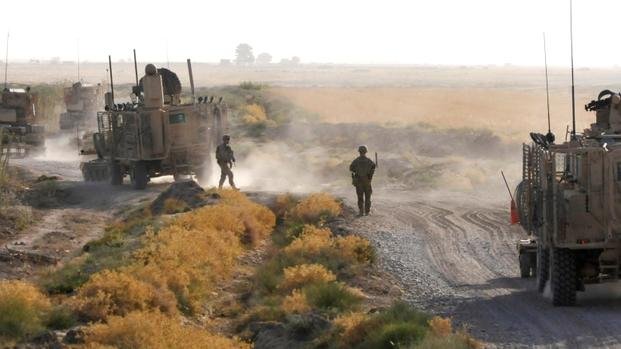Conventional U.S. ground forces are participating in counter-terrorist missions in Afghanistan, but not accompanying Afghan security forces on combat operations, the commander of U.S. Forces in Afghanistan said Friday.
The U.S. troops are part of NATO's Resolute Support mission to advise and train Afghan security forces, but they also play a role in Operation Freedom's Sentinel, the U.S. counter-terrorism operation against the remnants of al-Qaida; an emerging offshoot of the Islamic State of Iraq and Syria, or ISIS; and other terror groups.
As part of Freedom's Sentinel, Army Special Forces units accompany Afghan commandos and other troops into combat about 10 percent of the time, said Army Gen. John W. Nicholson Jr., commander of Resolute Support and U.S. Forces in Afghanistan, briefing reporters at the Pentagon.
"They go in an advisory role. They are not helping them conduct close combat, but they are there ... to call in air support or to provide terminal guidance for bombs or armed ISR or things of that nature," Nicholson said.
In addition to Special Forces, the Pentagon has deployed conventional ground combat units as part of Freedom's Sentinel.
"What we have in terms of conventional advisers would be in what we call expeditionary advising packages," Nicholson said. "These are primarily focused at the headquarters level, at the brigade or corps level."
As part of a recent combat operation, Nicholson deployed a package of conventional advisers for the Afghan 205th Corps or the 4th Brigade of the 205th, "but they weren't actually going out on operations," he said.
"They were at the headquarters advising them on how to use these enablers, and in that case, the enablers included close air support from F-16s, rotary-wing support from Apache helicopters and armed UAVs to provide direct support on the ground," Nicholson said.
In early September, the Pentagon announced it will deploy about 1,400 soldiers from the 101st Airborne Division (Air Assault), at Fort Campbell, Kentucky, to Afghanistan to participate in Freedom's Sentinel.
In late July, the Army announced that it will send 800 soldiers from 1st Combat Aviation Brigade, 1st Infantry Division, at Fort Riley, Kansas, to Afghanistan to support Freedom's Sentinel as well.
The aviation brigade will deploy with aircraft including AH-64 Apache attack helicopters and UH-60 Black Hawk utility helicopters sometime before October.
President Barack Obama in July announced a change in plans for U.S. troop levels in Afghanistan when he said 8,400 American service members would stay in the country into next year, leaving it up to his potential successor Donald Trump or Hillary Clinton to decide on the size of the military footprint there.
The president initially planned to reduce the U.S. troop presence in Afghanistan to 5,500 before he left office but changed course after a recommendation from Nicholson, the top U.S. commander in country. The current authorized level of U.S. troops in Afghanistan through the rest of the year stands at 9,800.









